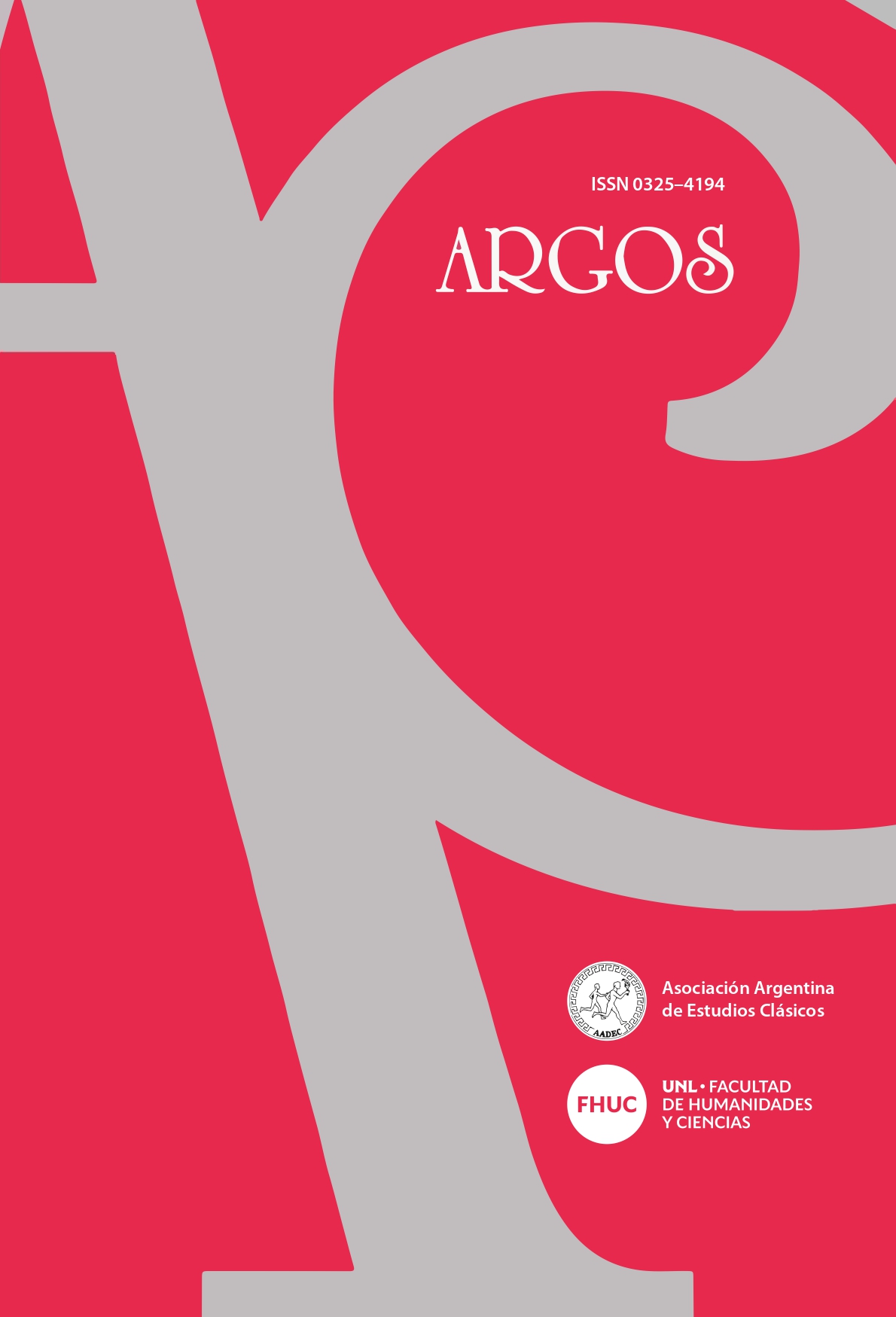La representación de Jasón en Heroidas 6 y 12 de Ovidio
DOI:
https://doi.org/10.14409/argos.2023.50.e0059Keywords:
Jason, female enunciative voices, intertextuality, Hypsipyle, MedeaAbstract
We analyse the lexemes lentus and fallax, as well as some syntagmata related to Jason in Ovid’s Heroides, wherethe fame of the hero and his original epic universe of belonging are critically addressed. The analysis demonstrates that, to insert Jason in the love elegy genre, Ovid appeals to a network of references, both intertextual (rooted in the previous representations of the character and his behavior) and intratextual (through the enunciative perspectives of Hypsipyle and Medea, fictitious authors of the Heroides 6 and 12).
References
Bibliografía
Ahl, F. (1985). Metaformations. Soundplay and Wordplay in Ovid and other Classical Poets. Ithaca & London.
Ahl, F. (1976). Lucan. An Introduction. Ithaca & London.
Albrecht, M. von (2014). Ovidio, una introducción. Murcia.
Alatorre, A. (1950). Heroidas. Universidad Nacional de México. México.
Anderson, J. (1986). On the sources of Ovid’s Heroides I, III, VII, X, XII. Berlín.
Barchiesi, A. (1992). P. Ovidii Nasonis Epistulae Heroidum 1-3. Felice Le Monnier. Firenze
Barkhuizen, J. (1979). “The Psychological Characterization of Medea in Apollonius of Rhodes, Argonautica 3.744-824”, AClass, 22, pp. 33-48.
Beye, C. (1968). “Jason as Love-hero in Apollonius’ Argonautica”, GRBS, 10, pp. 31-55.
Bloch, D. (2000). Ovid’s ‘Heroides 6’: Preliminary Scenes from the Life of an Intertextual Heroine. CQ, 50, 1, pp. 197-209.
Casali, S. (1994). “Ancora su Medea e Scilla (Ovidio, Heroides 12, 124)”, MD, 32, pp. 173-174.
Clausen, W. (1994). Virgil, Eclogues. Oxford.
Clauss, J. y Johnston, S. (1997). Medea. Essays on Medea in myth, literature, philosophy and art. Princeton.
Coleman, R. (1977). Virgil, Eclogues. Cambridge.
Fowler, D. (2000). Roman Constructions: Readings in Postmodern Latin. Oxford.
Fulkerson, L. (2005). The Ovidian Heroine as Author: Reading, Writing, and Community in the Heroides. Cambridge.
Glare, P. (ed.) (2012). The Oxford Latin Dictionary. Oxford.
Heinze, T. (1993). “The Authenticity of Ovid Heroides 12 reconsidered”, BISC, 38, pp. 94-97.
Hickey, J. (1966). “Ovid, Heroides 6. 54”, CR, 2, pp. 144-145.
Hunter, R. (1988). “Short on Heroics: Jason in the Argonautica”, CQ, 38(2), pp. 436-453.
Klein, T. (1983). “Apollonius’ Jason: Hero and Scoundrel”. QUCC, 13(1), pp. 115-126.
Knox, P. (1986) “Ovid’s Medea and the Authenticity of Heroide 12”, HSPh, 90, pp. 207-223.
Knox, P. (1995). Ovid: Heroides: Select epistles. Cambridge.
Lawall, G. (1996). “Apollonius’ Argonautica: Jasón as Anti-Hero”, YClS, pp. 121-169.
Leigh, M. (1997). “Ovid, Heroides 6.1-2”. CQ, 2, pp. 605-607.
Liddell, H. G. y Scott, R. (1996). A Greek-English Lexicon, Oxford.
Llanos, P. (2013). “Viaje y narración en Argonáuticas de Apolonio de Rodas: Las “Argonáuticas” de Jasón”, Síntesis, 4, pp. 1-15.
Michalopoulos, A. (2004). “Fighting against a witch: The importance of magic in Hypsipyle’s letter to Jason (Ov., HER. 6)”, Mene, 4, pp. 95-122.
Ramírez de Verger, A. (2006). P. Ovidius Naso, Carmina Amatoria. Múnich.
Ruiz de Elvira, A. (1982). Mitología Clásica. Madrid.
Schniebs, A. (2006). De Tibulo al Ars amatoria. Buenos Aires.
Tarrant, R. (1983). “Heroides”. En: Reynolds, L. D. (Ed). Texts and transmission. A Survey of the Latin Classics (pp. 268-273). Oxford.
Tarrant, R. (2004). P. Ovidi Nasonis, Metamorphoses. Oxford.
Tola, E. (2005). Ovidio. Metamorfosis. Una introducción crítica. Buenos Aires.
Tola, E. (2019). “Ille ego sum lignum qui non admittar in ullum (Ov. Pont. I, 2, 33) ou l’écriture poétique à l’épreuve de l’exil”, VL, 199, 3, pp. 74-91.
Toohey, P. (1992). Reading Epic, An introduction to the ancient narratives. NewYork.
Ugartemendía, C. (2017). “Capítulo 2: Didatismo nas Heroides”. En: A exemplaridade do abandono: epístola elegíaca e intratextualidade nas Heroides de Ovídio. São Paulo.
Vaiopoulos, V. (2013). “Between Lament and Irony: Some Cross-references in Ovid’s Heroides 6 and 12”, MS, 21, 2, pp.122-148.
Vian, F.&Delage, É. (2009). Apollonios de Rhodes, Argonautiques. París.
Downloads
Published
How to Cite
Issue
Section
License
Copyright (c) 2024 Argos

This work is licensed under a Creative Commons Attribution-NonCommercial-ShareAlike 4.0 International License.



